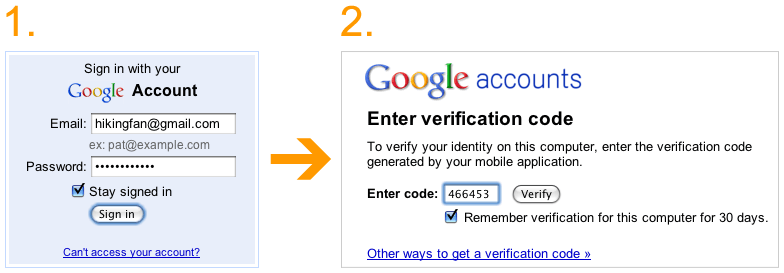Advanced Sign-in Security for Your Google Account
Google has announced increased security measures designed to protect users’ Google accounts.
A few months back, Google started testing out a Google Apps feature called 2-step verification. 2-step verification is an opt-in setting that offers added protection for those who aren’t satisfied that a password alone will protect their Google account.
Similar to the way your online banking requires more than one password or code to be entered before you have access to your account, 2-step verification will require those who opt-in to employ a second password in the form of a code that you can either receive from Google (via phone or SMS) or generate yourself on your Android, BlackBerry, or iPhone smartphone. This means that to gain access to your account, a hacker would need both your password and your cell phone to get in. There’ll also be the ability to ‘remember verification for 30 days’ which will mean you won’t have to do the verification-code-phone-dance for a month.
Google is in the process of rolling out this feature so keep an eye out for the 2-step verification link in your account settings.
Get Tom's Hardware's best news and in-depth reviews, straight to your inbox.

Jane McEntegart is a writer, editor, and marketing communications professional with 17 years of experience in the technology industry. She has written about a wide range of technology topics, including smartphones, tablets, and game consoles. Her articles have been published in Tom's Guide, Tom's Hardware, MobileSyrup, and Edge Up.
-
Darkk This isn't a bad idea. However, it makes more sense to me to have google send me a alert text when something has been changed on my account. Something most banks do now.Reply
-
JOSHSKORN What would make more sense to do is for Google to keep track of what computers/devices you sign on from and if the device is allowed to access your account. Also, if you have to login to your account from a different device (or public machine), have an option for "Allow other devices to sign into this account". Is Google allowed to connect information about a computer such as MAC address or Windows key?Reply -
squallypie This would probably improve the feeling of safety for the users of Google Chrome OS, since the whole OS is dependent on online stuff, mainly google's services.Reply -
lancelot123 I've always thought that Blizzard's Authenticator idea would expand into other areas. Should have been done sooner, it is such a good idea, especially for banks.Reply -
Nakal Not like it is Blizzards Idea, we have been using the securID platform for our VPN for well over a decade where i work.Reply -
nebun they should implement special characters, upper case, and lower case letters...just like the military...also ask the use to change the password every 30 days or maybe 60 daysReply -
randomizer They've had this for a while now when creating new Gmail accounts. I need Gmail accounts for work, so it was very annoying when for 2 days the verification codes just never got sent to me no matter how many times I told it to resend them! It's not a bad idea but as soon as the system fails to work as it should it becomes nothing but a time waster. I'm waiting for the day when my Bank fails to send me a code when I need to make a payment ASAP...Reply -
Wish I Was Wealthy I like the idea in one way,but then again not...You have to carry a mobile phone with you all the time or at least to get the verification code from google,but at least it will last for a month...I remember seeing some guy from New York on TV saying that you should not be on the internet banking computer for longer then 5 minutes or else there is a big risk of you getting hacked...He mentioned that he had two computers one for internet banking & the other just for surfing...Reply -
Wish I Was Wealthy I have several bank accounts...In one of those bank accounts,I have to open up my browser to let in cookies...On the second bank account,I do not have to open up my browser to let cookies in at all...So I think on the second one they actually have two passwords kind of,but also I read something about where there is something inbuilt within the pages that you download onto your computer and your computer is read that way by viewing pages on the internet & so I guess that the second bank does not need you to open up your browser to let in cookies...Reply
